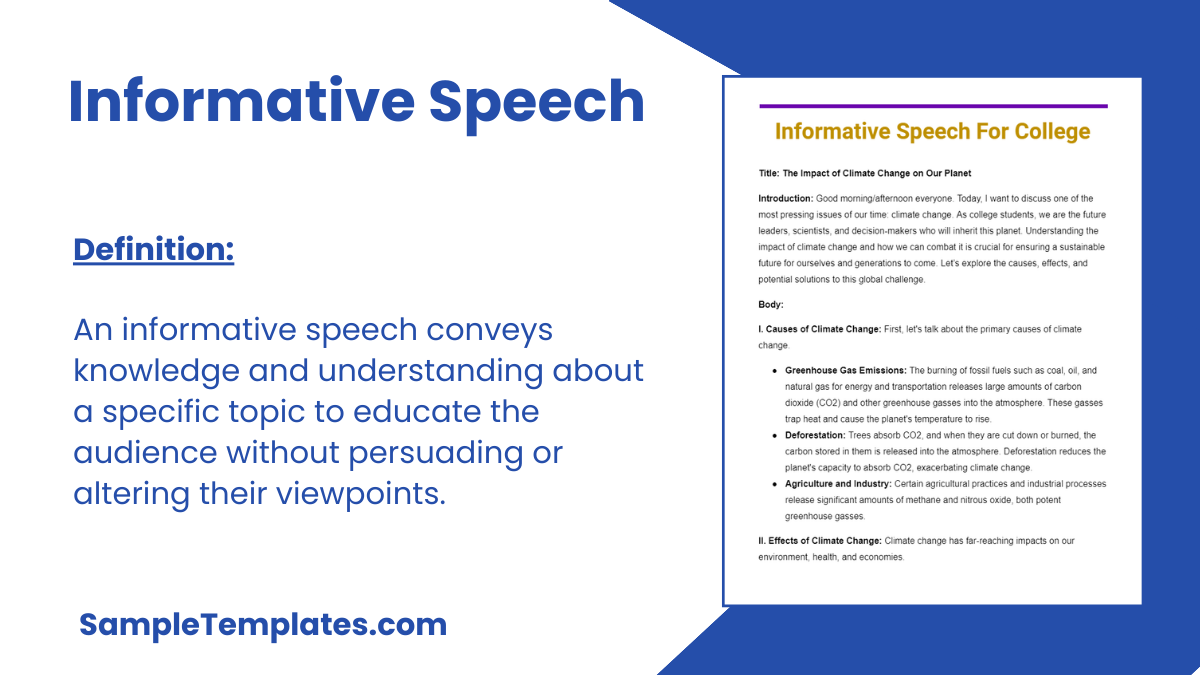An informative speech provides information and insights on a particular subject. It is very popular among students, and several contests and completions are held annually to check the oratory of a person. Even scholarship tests are sometimes based on this ability. Informative speeches are quite popular in corporate events as well and. To get a clear idea about the skills that you need to possess, kindly check the following informative Speech Examples which illustrate the art of oratory in simple steps.
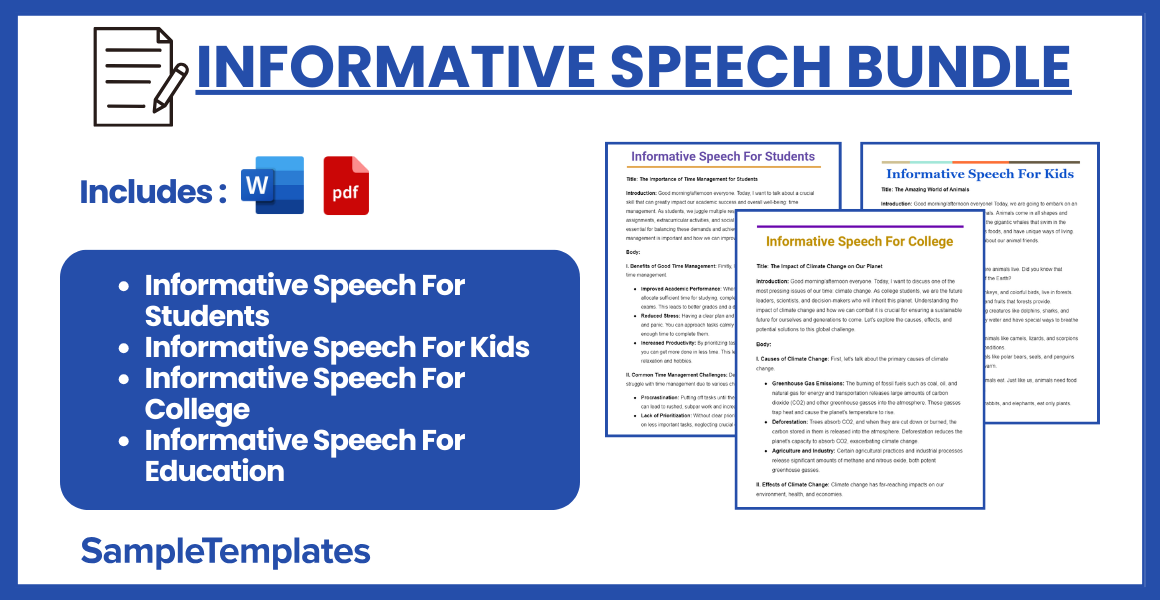
Download Informative Speech Bundle
Informative Speech For Students
Title: The Importance of Time Management for Students
Introduction: Good morning/afternoon everyone. Today, I want to talk about a crucial skill that can greatly impact our academic success and overall well-being: time management. As students, we juggle multiple responsibilities, including classes, assignments, extracurricular activities, and social life. Effective time management is essential for balancing these demands and achieving our goals. Let’s explore why time management is important and how we can improve our skills in this area.
Body:
I. Benefits of Good Time Management: Firstly, let’s discuss the benefits of effective time management.
- Improved Academic Performance: When you manage your time well, you can allocate sufficient time for studying, completing assignments, and preparing for exams. This leads to better grades and a deeper understanding of the material.
- Reduced Stress: Having a clear plan and schedule reduces the last-minute rush and panic. You can approach tasks calmly and confidently, knowing you have enough time to complete them.
- Increased Productivity: By prioritizing tasks and focusing on what’s important, you can get more done in less time. This leaves you with more free time for relaxation and hobbies.
II. Common Time Management Challenges: Despite its importance, many students struggle with time management due to various challenges.
- Procrastination: Putting off tasks until the last minute is a common issue. This can lead to rushed, subpar work and increased stress.
- Lack of Prioritization: Without clear priorities, it’s easy to spend too much time on less important tasks, neglecting crucial ones.
- Distractions: Social media, phone notifications, and other distractions can eat up valuable time and break your focus.
III. Strategies for Effective Time Management: Now, let’s explore some strategies to improve our time management skills.
- Create a Schedule: Use a planner or digital calendar to map out your day, week, or month. Include time for classes, study sessions, assignments, and breaks. Stick to your schedule as closely as possible.
- Set SMART Goals: Make your goals Specific, Measurable, Achievable, Relevant, and Time-bound. This helps you stay focused and motivated.
- Prioritize Tasks: Identify the most important and urgent tasks and tackle them first. Use techniques like the Eisenhower Matrix to categorize tasks by urgency and importance.
- Break Tasks into Smaller Steps: Large projects can be overwhelming. Break them down into smaller, manageable steps and set deadlines for each step.
- Minimize Distractions: Find a quiet, dedicated study space. Turn off unnecessary notifications and limit your use of social media during study times.
IV. Balancing Time for Yourself: While focusing on academics is important, it’s also crucial to allocate time for self-care and relaxation.
- Take Breaks: Regular breaks during study sessions can improve focus and productivity. Use techniques like the Pomodoro Technique to work in focused intervals with short breaks in between.
- Engage in Hobbies: Make time for activities you enjoy. Hobbies can help you relax, recharge, and maintain a positive outlook.
- Get Enough Sleep: Adequate sleep is essential for cognitive function and overall well-being. Aim for 7-9 hours of sleep per night.
Conclusion: In conclusion, time management is a vital skill that can enhance our academic performance, reduce stress, and improve our overall quality of life. By creating a schedule, setting SMART goals, prioritizing tasks, and minimizing distractions, we can make the most of our time and achieve our goals. Remember to balance your academic responsibilities with self-care and relaxation. Thank you for listening, and I hope these tips will help you manage your time more effectively
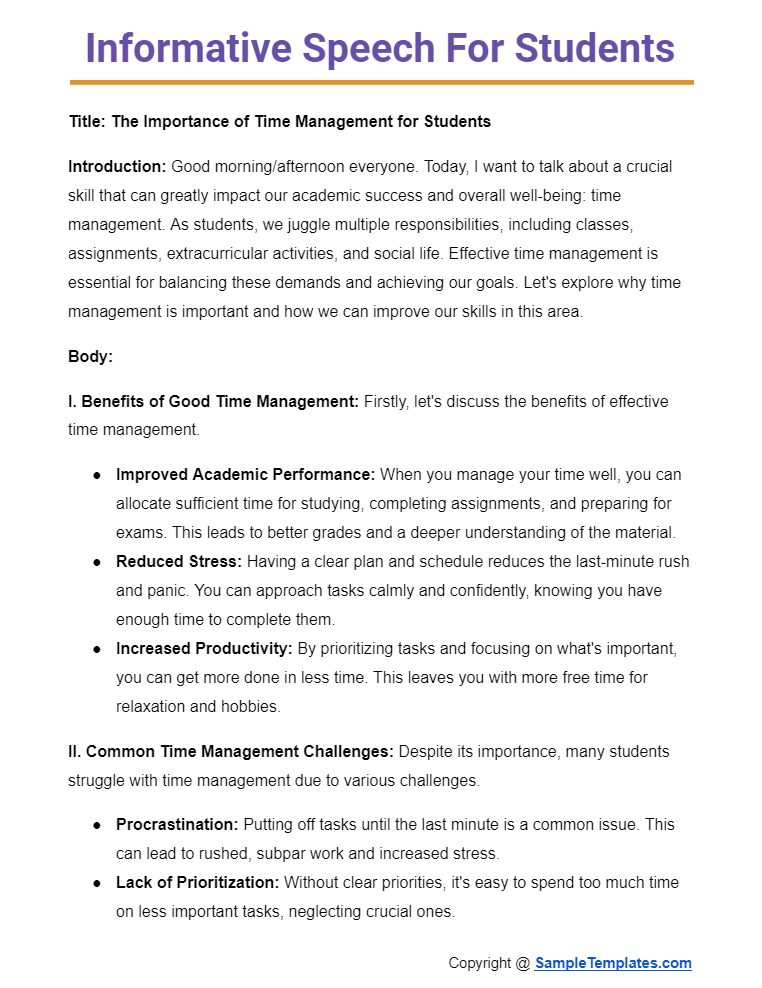
Informative Speech For Kids
Title: The Amazing World of Animals
Introduction: Good morning/afternoon everyone! Today, we are going to embark on an exciting journey into the amazing world of animals. Animals come in all shapes and sizes, from the tiny ants that march in a line to the gigantic whales that swim in the ocean. They live in different places, eat various foods, and have unique ways of living. Let’s dive in and learn some fascinating facts about our animal friends.
Body:
I. Different Habitats: First, let’s talk about where animals live. Did you know that animals can be found in almost every corner of the Earth?
- Forests: Some animals, like tigers, monkeys, and colorful birds, live in forests. These animals enjoy the trees, leaves, and fruits that forests provide.
- Oceans: In the oceans, we find amazing creatures like dolphins, sharks, and jellyfish. These animals swim in the salty water and have special ways to breathe and move.
- Deserts: Deserts are hot and dry, but animals like camels, lizards, and scorpions are adapted to survive in these harsh conditions.
- Arctic: The Arctic is cold and icy. Animals like polar bears, seals, and penguins have thick fur or blubber to keep them warm.
II. Different Diets: Next, let’s explore what animals eat. Just like us, animals need food to survive, but their diets can be quite different.
- Herbivores: Some animals, like cows, rabbits, and elephants, eat only plants. They are called herbivores.
- Carnivores: Carnivores, like lions, wolves, and hawks, eat other animals. They have sharp teeth and claws to help them catch their prey.
- Omnivores: Omnivores, like bears, pigs, and humans, eat both plants and animals. This gives them a wide variety of food to choose from.
III. Unique Adaptations: Animals have special features and behaviors that help them survive in their environments. These are called adaptations.
- Camouflage: Some animals, like chameleons and certain insects, can change their color to blend in with their surroundings. This helps them hide from predators.
- Speed: Cheetahs are the fastest land animals. They can run up to 60 miles per hour to catch their prey.
- Migration: Many birds, like the Arctic Tern, travel long distances from one part of the world to another to find food and suitable weather.
Conclusion: In conclusion, animals are incredible creatures with diverse habitats, diets, and adaptations. They play important roles in our ecosystems and make our world a more fascinating place. The next time you see an animal, whether it’s a tiny ant or a mighty whale, remember that it has its own special way of living and surviving. Let’s appreciate and protect the amazing world of animals. Thank you for listening!
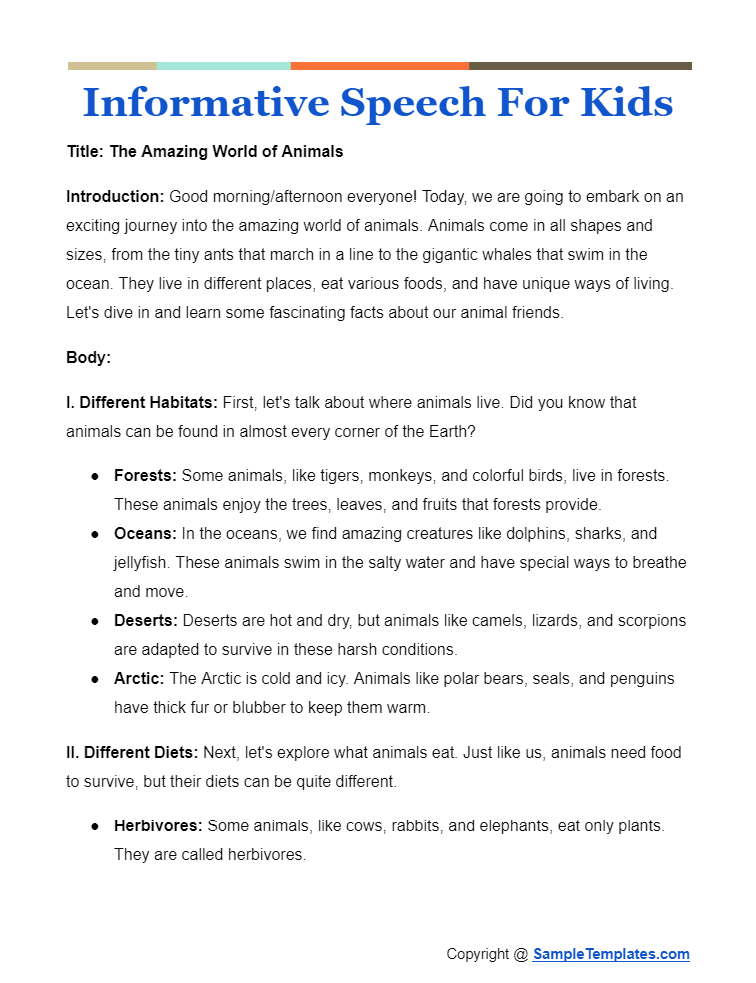
Informative Speech For College
Title: The Impact of Climate Change on Our Planet
Introduction: Good morning/afternoon everyone. Today, I want to discuss one of the most pressing issues of our time: climate change. As college students, we are the future leaders, scientists, and decision-makers who will inherit this planet. Understanding the impact of climate change and how we can combat it is crucial for ensuring a sustainable future for ourselves and generations to come. Let’s explore the causes, effects, and potential solutions to this global challenge.
Body:
I. Causes of Climate Change: First, let’s talk about the primary causes of climate change.
- Greenhouse Gas Emissions: The burning of fossil fuels such as coal, oil, and natural gas for energy and transportation releases large amounts of carbon dioxide (CO2) and other greenhouse gases into the atmosphere. These gases trap heat and cause the planet’s temperature to rise.
- Deforestation: Trees absorb CO2, and when they are cut down or burned, the carbon stored in them is released into the atmosphere. Deforestation reduces the planet’s capacity to absorb CO2, exacerbating climate change.
- Agriculture and Industry: Certain agricultural practices and industrial processes release significant amounts of methane and nitrous oxide, both potent greenhouse gases.
II. Effects of Climate Change: Climate change has far-reaching impacts on our environment, health, and economies.
- Rising Temperatures: Global temperatures are increasing, leading to more frequent and severe heatwaves. This affects ecosystems, agriculture, and human health.
- Melting Ice Caps and Rising Sea Levels: The polar ice caps and glaciers are melting, causing sea levels to rise. This threatens coastal communities with flooding and erosion.
- Extreme Weather Events: Climate change is linked to an increase in the frequency and intensity of extreme weather events such as hurricanes, droughts, and wildfires. These events cause widespread damage and displacement.
- Impacts on Biodiversity: Many species are struggling to adapt to changing temperatures and habitats, leading to a loss of biodiversity. This can disrupt ecosystems and the services they provide, such as pollination and water purification.
III. Potential Solutions: Addressing climate change requires a multifaceted approach involving individuals, businesses, and governments.
- Renewable Energy: Transitioning to renewable energy sources like solar, wind, and hydroelectric power can significantly reduce greenhouse gas emissions. Investing in renewable energy technologies is crucial for a sustainable future.
- Energy Efficiency: Improving energy efficiency in buildings, transportation, and industry can reduce energy consumption and emissions. Simple actions like using energy-efficient appliances and insulating homes can make a difference.
- Sustainable Agriculture and Forestry: Adopting sustainable farming practices and protecting forests can reduce emissions from agriculture and deforestation. Reforestation and afforestation efforts can help absorb CO2 from the atmosphere.
- Policy and Legislation: Governments play a key role in combating climate change by implementing policies and regulations that limit emissions, promote renewable energy, and protect natural resources. International agreements like the Paris Agreement aim to unite countries in the fight against climate change.
- Individual Actions: Each of us can contribute to mitigating climate change by making sustainable choices in our daily lives. Reducing energy consumption, using public transportation, recycling, and supporting eco-friendly products and companies are all important steps.
Conclusion: In conclusion, climate change is a complex and urgent issue that requires immediate action from all sectors of society. By understanding the causes and effects of climate change, and by implementing and supporting sustainable solutions, we can work towards a healthier, more sustainable planet. As college students, we have the power to make a difference through our choices, actions, and advocacy. Let’s commit to being part of the solution and ensuring a better future for all. Thank you for listening
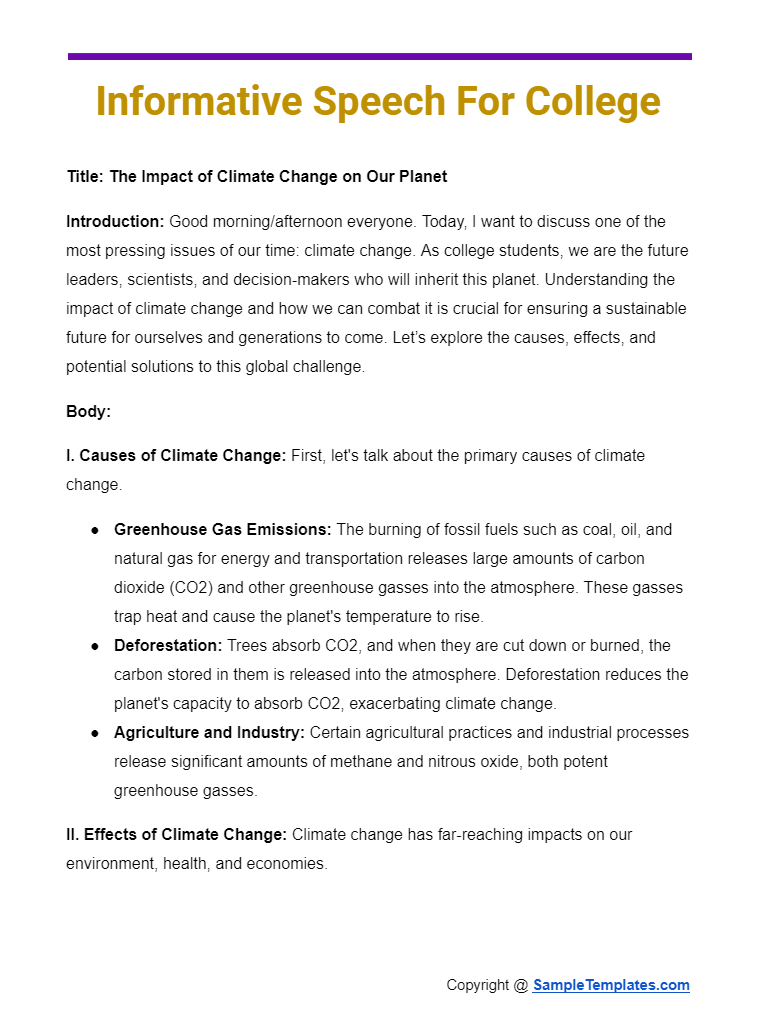
Informative Speech For Education
Title: The Importance of Lifelong Learning in the Modern World
Introduction: Good morning/afternoon everyone. Today, I want to talk about the importance of lifelong learning. In a world that is constantly changing due to rapid technological advancements and evolving societal needs, continuous education is essential. Lifelong learning is the ongoing, voluntary pursuit of knowledge for personal or professional reasons. It not only enhances our understanding and skills but also enriches our lives. Let’s explore why lifelong learning is crucial and how it benefits us in various aspects of life.
Body:
I. Adapting to Technological Changes: Firstly, let’s consider how lifelong learning helps us adapt to technological changes.
- Keeping Up with Innovation: Technology evolves at a rapid pace. New tools, software, and methodologies emerge frequently. Lifelong learning ensures that we stay current with these advancements, making us more competent and versatile in our professional roles.
- Enhancing Digital Literacy: As technology becomes more integrated into our daily lives, digital literacy becomes increasingly important. Lifelong learning helps us develop the skills needed to navigate digital environments effectively and safely.
II. Professional Development: Next, let’s discuss the role of lifelong learning in professional development.
- Career Advancement: Continuous learning opens up new career opportunities. By acquiring new skills and knowledge, we become more valuable employees, increasing our chances of promotions and salary increases.
- Job Security: In a competitive job market, those who continue to learn and adapt are more likely to retain their jobs. Lifelong learning helps us stay relevant in our fields and makes us more adaptable to changes in the job market.
- Entrepreneurship: For those interested in starting their own business, lifelong learning is essential. It provides the knowledge and skills needed to navigate the complexities of entrepreneurship, from understanding market trends to mastering financial management.
III. Personal Growth and Fulfillment: Lifelong learning also contributes significantly to personal growth and fulfillment.
- Cognitive Health: Engaging in continuous learning activities keeps our minds sharp. It can help prevent cognitive decline and reduce the risk of diseases like Alzheimer’s.
- Self-Confidence: Gaining new knowledge and skills boosts our self-confidence. It empowers us to take on new challenges and pursue our goals with greater assurance.
- Fulfillment and Satisfaction: Learning for personal enrichment brings joy and satisfaction. Whether it’s picking up a new hobby, learning a new language, or understanding a new subject, the process of learning itself can be incredibly fulfilling.
IV. Social and Community Benefits: Lastly, lifelong learning has broader social and community benefits.
- Civic Engagement: Educated individuals are more likely to participate in civic activities, such as voting and community service. Lifelong learning fosters a sense of responsibility and engagement in societal issues.
- Social Connections: Learning often brings people together, whether through formal classes, online courses, or informal study groups. This can help build social connections and a sense of community.
- Cultural Awareness: Lifelong learning encourages us to explore different cultures and perspectives. This fosters greater understanding and tolerance, contributing to a more inclusive and harmonious society.
Conclusion: In conclusion, lifelong learning is essential in the modern world. It helps us adapt to technological changes, advances our careers, contributes to personal growth, and benefits society as a whole. As students and future professionals, embracing the concept of lifelong learning will equip us with the tools needed to navigate an ever-changing world successfully. Let’s commit to continuous education and strive to be lifelong learners, always curious and eager to grow. Thank you for listening.
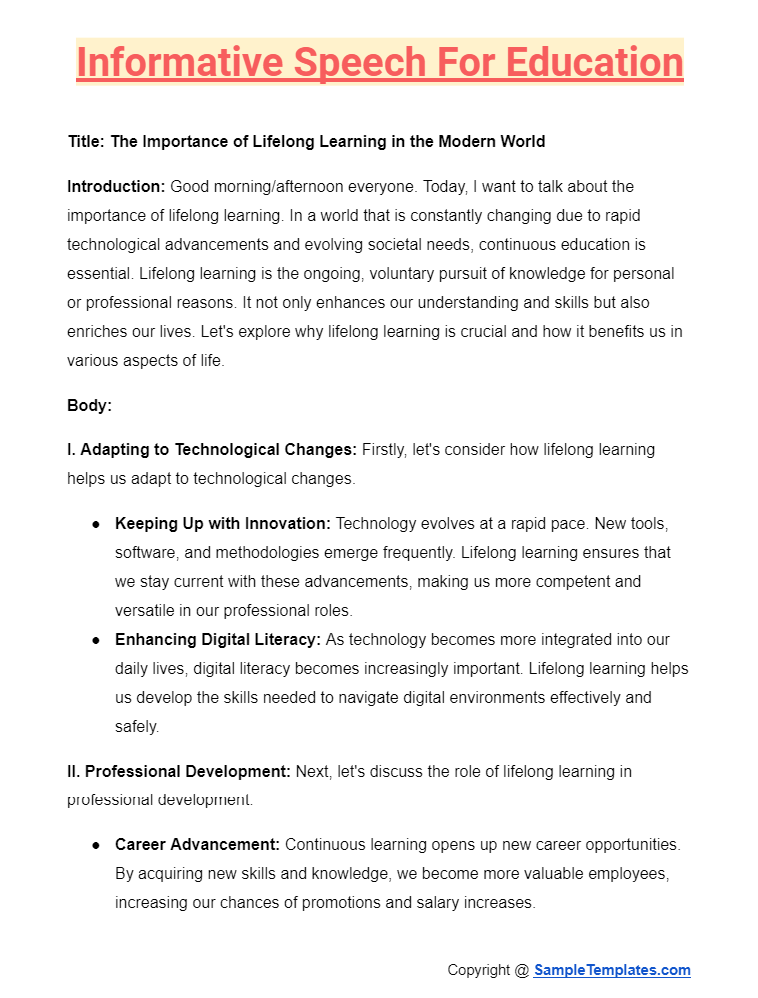
Browse More Templates On Informative Speech
Informative Speech Outline Example
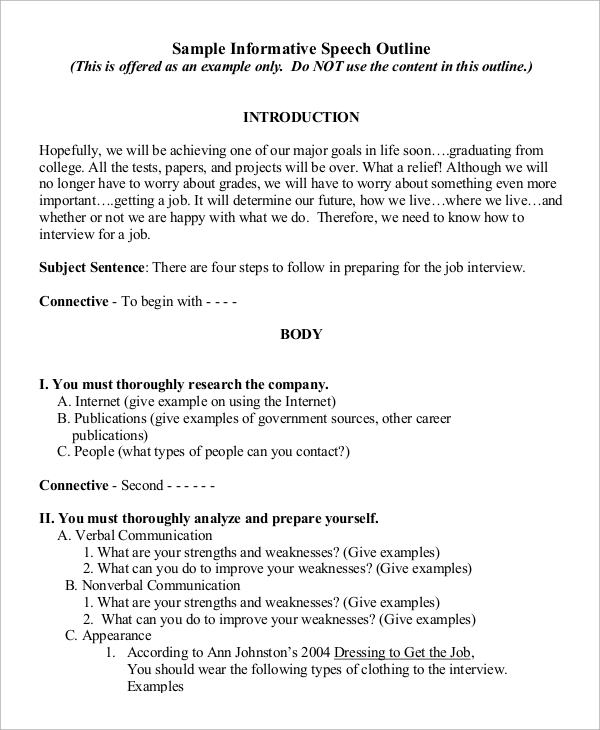
Details
File Format
Size: 117 KB
DownloadThis is an excellent Speech Outline Example for an informative speech which states what to speak in the introduction with sample statement, what to cover in the body of the speech with subparts and connecting statements and words to use and finally what to say in conclusion to achieve the objective clearly.
Informative Speech Topics Example
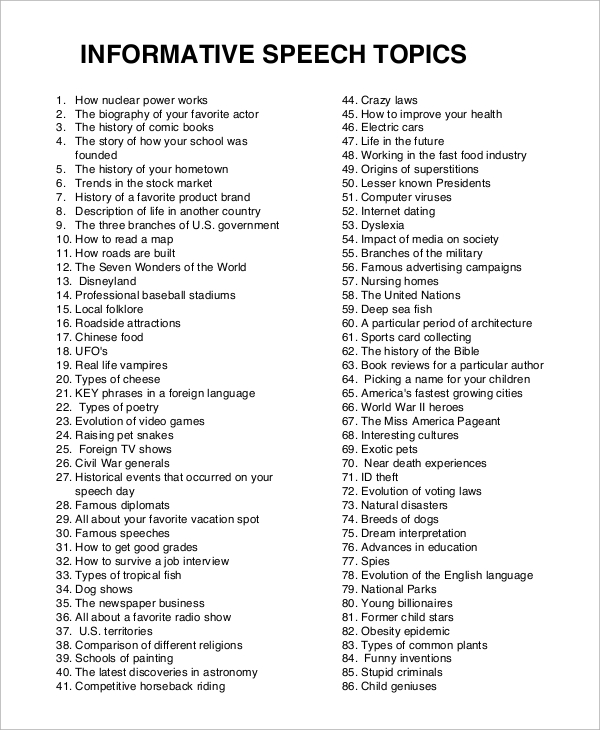
Details
File Format
Size: 43 KB
DownloadThis is a huge list of 165 topics on which information speech can be delivered on any stage. There are topics for debate, topics for speech delivery and contests for scholarships, corporate speech topics, general topics for discussion and much more.
Informative Speech Introduction Example
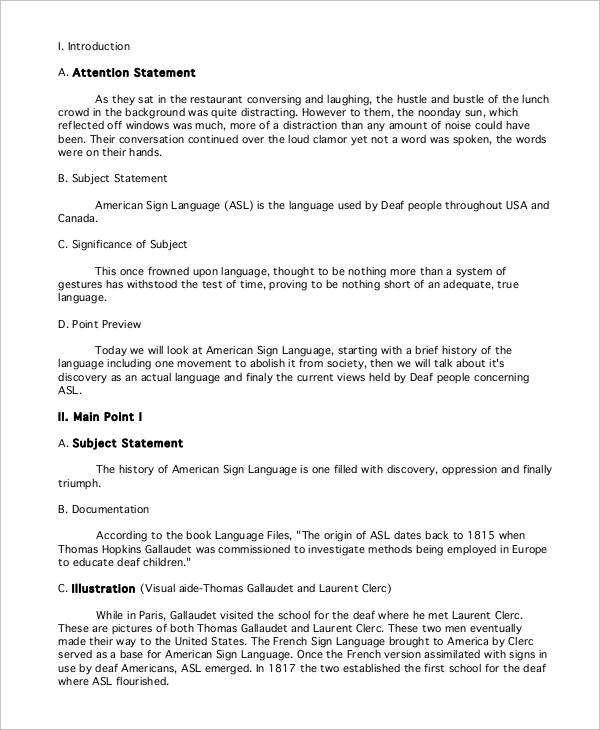
Details
File Format
Size: 48 KB
DownloadThis is a manual that deals with how to write and make an impressive introduction while speaking on an educational topic. It comes with multiple statements that will get the attention of the audiences immediately. It also shows how to handle the different topics with different introduction summary.
Usage
Informative speech delivery is a great technique that a person needs in every step of life. Starting from the school days to colleges and even in professional life, people have to deliver amazing speeches on a particular information topic or even on a person. The above-listed information speech examples have a list of topics on which you can speak. They also have all the guidelines needed to nail such speeches effortlessly. You can also evaluate your speech from the introduction to the conclusion to perform better every time. You can also see the Introductory Speech Examples.
How Do I Start off an Informative Speech?
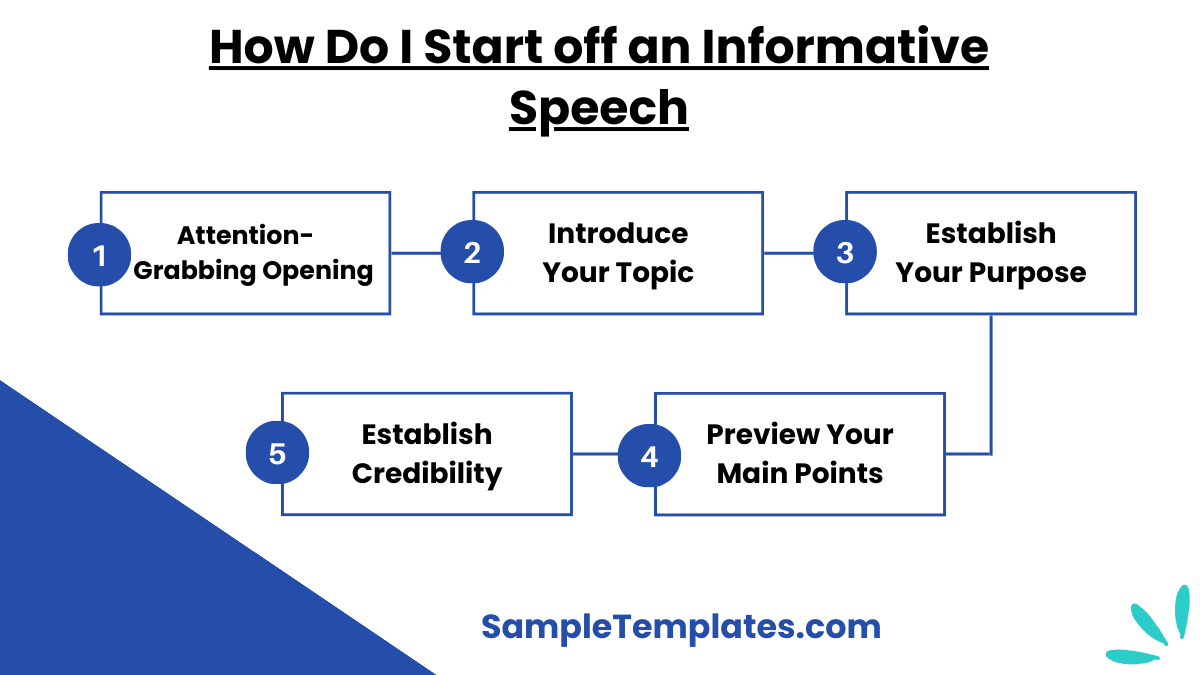
Starting off an informative speech effectively involves grabbing the audience’s attention, introducing your topic clearly, and establishing your credibility. Here’s a structured approach to help you begin your speech:
- Attention-Grabbing Opening:
- Start with a Hook: This can be an interesting fact, a thought-provoking question, a quote, a short anecdote, or a surprising statistic related to your topic.
- Example: “Did you know that over 2.5 quintillion bytes of data are created every day? That’s enough information to fill ten million Blu-ray discs!”
- Introduce Your Topic:
- Clearly State Your Topic: After grabbing their attention, introduce the topic of your speech in a clear and concise manner.
- Example: “Today, I’m going to talk about the impact of big data on our daily lives.”
- Establish Your Purpose:
- Explain Why the Topic is Important: Briefly mention why this topic is relevant and important to the audience.
- Example: “Understanding big data is crucial because it affects everything from the ads we see online to the medical treatments we receive.”
- Preview Your Main Points:
- Outline What You’ll Cover: Give a brief overview of the main points you’ll be discussing in your speech.
- Example: “In this speech, we’ll explore what big data is, how it’s collected, and the various ways it’s being used in different industries.”
- Establish Credibility:
- Share Your Connection to the Topic: Briefly explain your interest in the topic or mention any relevant research or experience you have.
- Example: “As a data science major, I have spent the past two years studying how data analytics is transforming our world”. You can also see more on Informative Speech Thesis Statement.
Informative Speech Evaluation Example
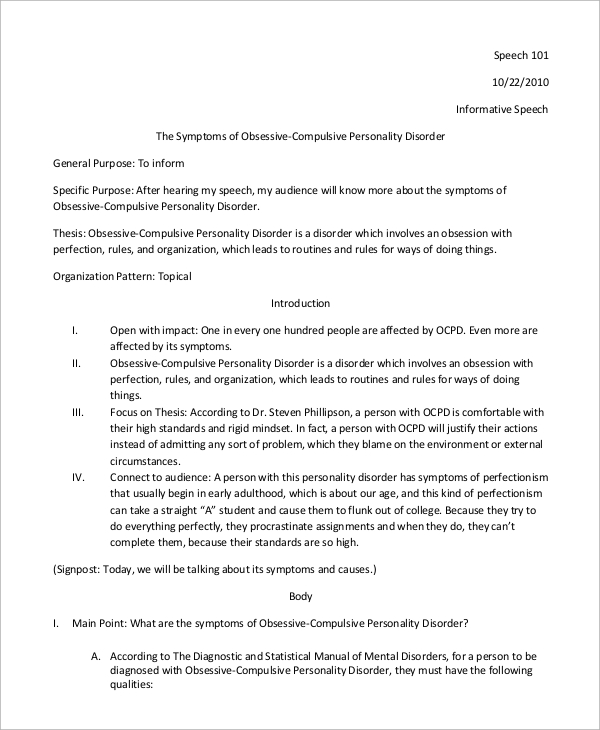
Details
File Format
Size: 57 KB
DownloadThis is a perfect example of how to evaluate your informative speech once the sample summary writing is complete. It comes with a list of questions for evaluating the introduction, body, and conclusion individually.
Informative Speech on a Person Example
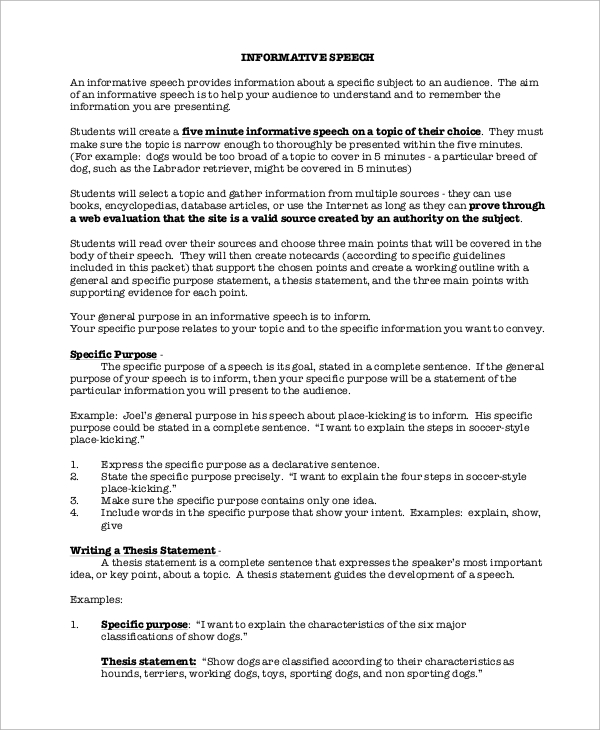
Details
File Format
Size: 56 KB
DownloadThis is a complete manual on how to deliver a perfect informative speech on a character or personality. It comes with all the points that need to be covered, what points to be covered at what time of the speech and how to prepare a draft. It comes with a list of topics and examples to illustrate them.
Informative Speech Worksheet Example
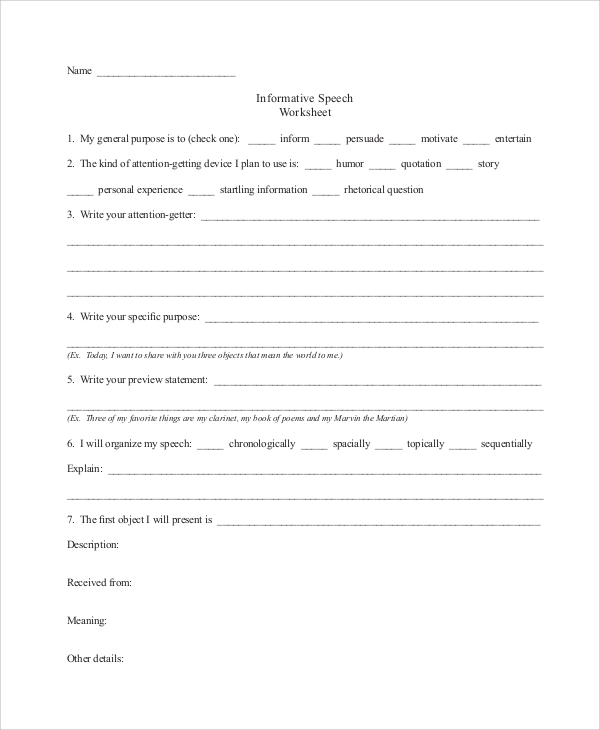
Details
File Format
Size: 131 KB
DownloadTargeted Audience
The targeted audiences of the informative speech examples are the students who have to deliver speeches on topics to win a scholarship or any competition for that matter. They are useful for experienced employers who are managers, and they need to deliver impressive speeches on different topics in various events. As a matter of fact, everyone needs them to become better at public speaking skills. You can also see the Retirement Speech Examples.
4 Types of Informative Speeches
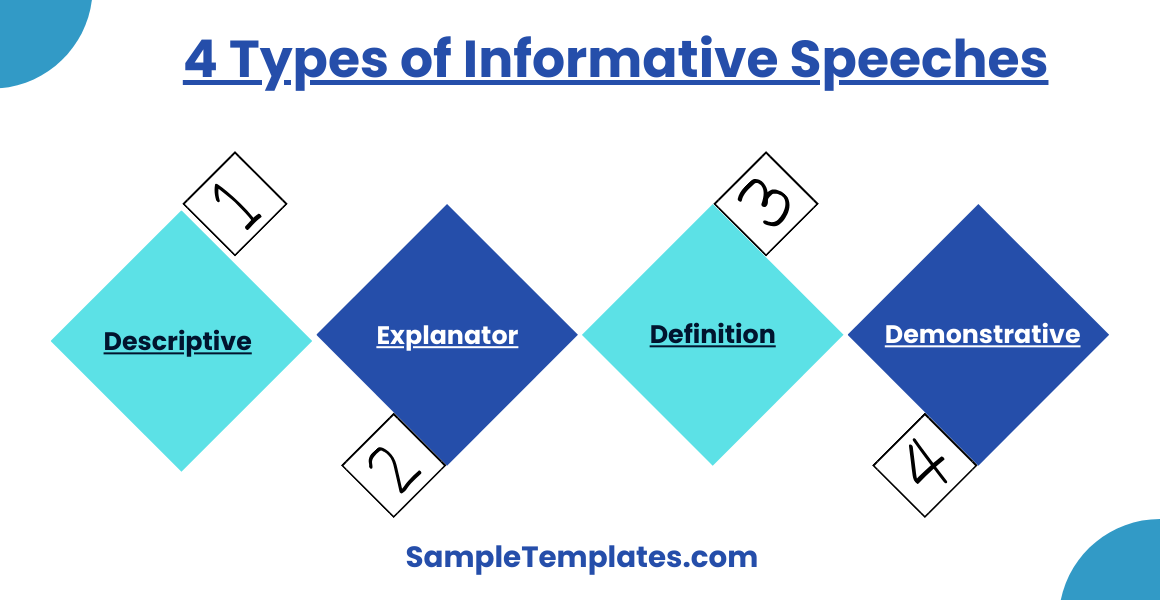
Informative speeches are designed to educate the audience about a particular topic. There are several types of informative speeches, each serving a different purpose. Here are four main types:
- Descriptive Speeches:
- Purpose: To create a vivid picture of a person, place, thing, or event for the audience.
- Example: A speech detailing the architecture and cultural significance of the Eiffel Tower.
- Key Elements: Use of descriptive language, sensory details, and vivid imagery to help the audience visualize the subject. You can also see more on Speech Examples.
- Explanatory Speeches:
- Purpose: To explain how or why something works, happens, or is the way it is.
- Example: A speech explaining the process of photosynthesis in plants.
- Key Elements: Clear explanations, logical organization, and use of examples or analogies to make complex concepts understandable.
- Definition Speeches:
- Purpose: To define a concept, term, or theory that may be unfamiliar to the audience.
- Example: A speech defining the term “blockchain” and explaining its importance in modern technology.
- Key Elements: Clear definitions, context for understanding, and sometimes comparison with familiar concepts to enhance comprehension.
- Demonstrative Speeches:
- Purpose: To show the audience how to do something or how something works.
- Example: A speech demonstrating how to bake a chocolate cake, step by step.
- Key Elements: Step-by-step instructions, visual aids or actual demonstrations, and practical tips to ensure the audience can replicate the process. You can also see more on Informative Speech Outline.
Sample Informative Speech Format
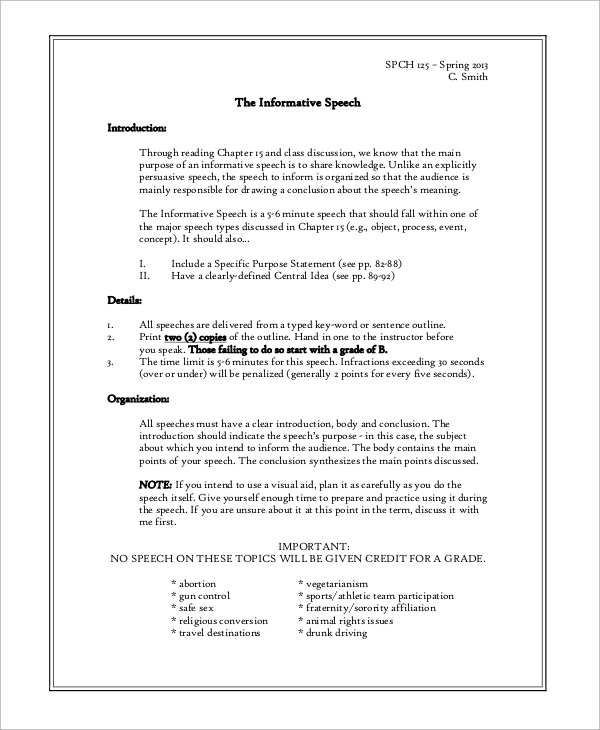
Details
File Format
Size: 29 KB
DownloadGroup Informative Speech Example
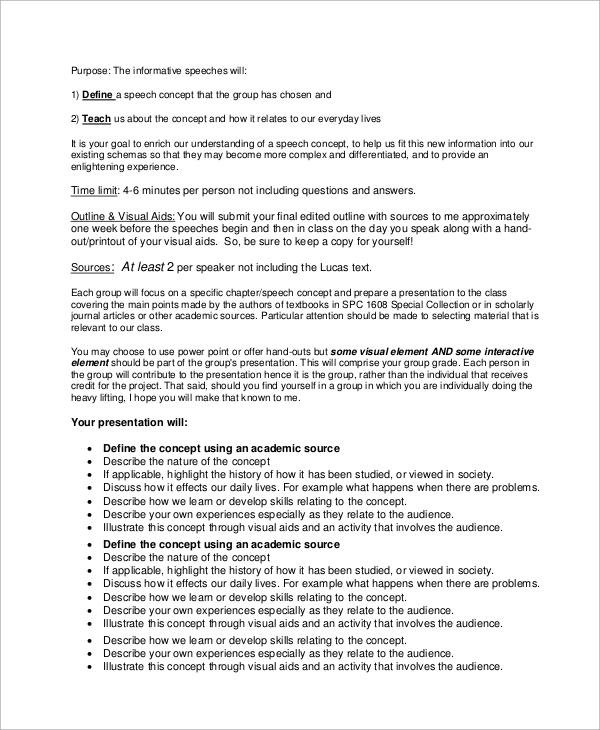
Details
File Format
Size: 100 KB
DownloadInformative Speech Ideas
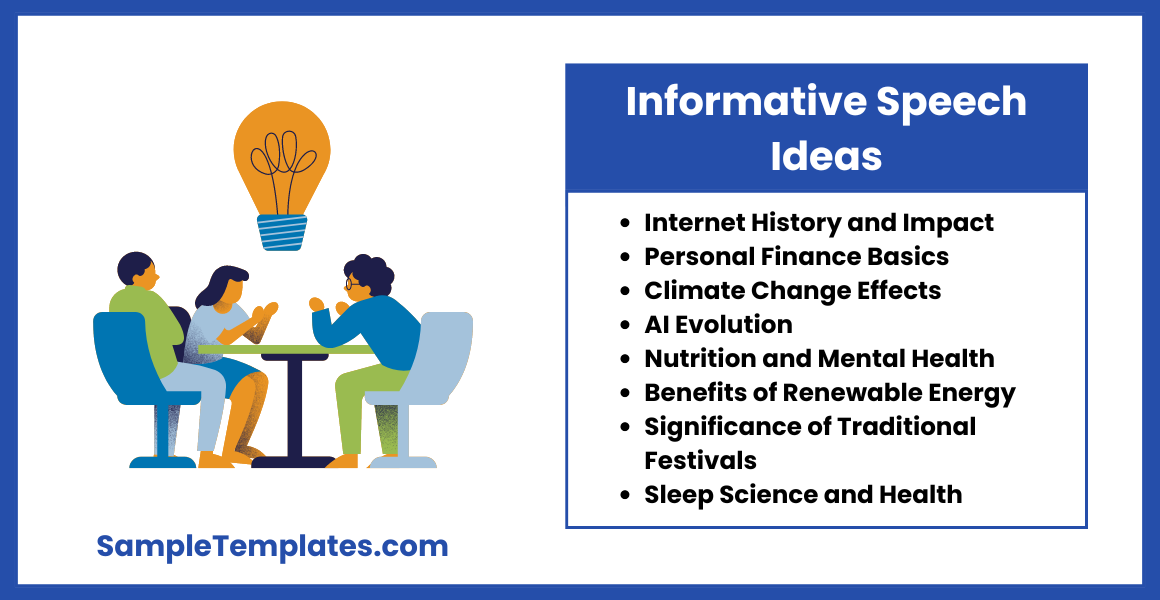
- The History and Impact of the Internet
- Explore the origins of the internet, its development over the decades, and how it has transformed communication, business, and everyday life.
- The Basics of Personal Finance Management
- Discuss essential financial skills such as budgeting, saving, investing, and managing debt, highlighting the importance of financial literacy. You can also see more on Speech Writing.
- Climate Change and Its Effects on the Planet
- Explain the science behind climate change, its environmental and social impacts, and potential solutions to mitigate its effects.
- The Evolution of Artificial Intelligence
- Trace the development of AI from its inception to modern-day applications, and explore its implications for the future of work, healthcare, and daily life.
- The Role of Nutrition in Mental Health
- Examine the connection between diet and mental well-being, including how certain nutrients and eating habits can influence mood and cognitive function.
- Renewable Energy Sources and Their Benefits
- Provide an overview of renewable energy sources such as solar, wind, and hydroelectric power, and discuss their advantages over fossil fuels.
- The Cultural Significance of Traditional Festivals Around the World
- Highlight various traditional festivals, their historical roots, and their cultural importance in different societies.
- The Science of Sleep and Its Importance for Health
- Delve into the stages of sleep, common sleep disorders, and tips for improving sleep quality, emphasizing the role of sleep in overall health.
Each of these topics offers ample scope for research and can be tailored to suit your audience’s interests and knowledge level. You can also see more on Demonstrative Speech Outline.
Career Informative Speech Example
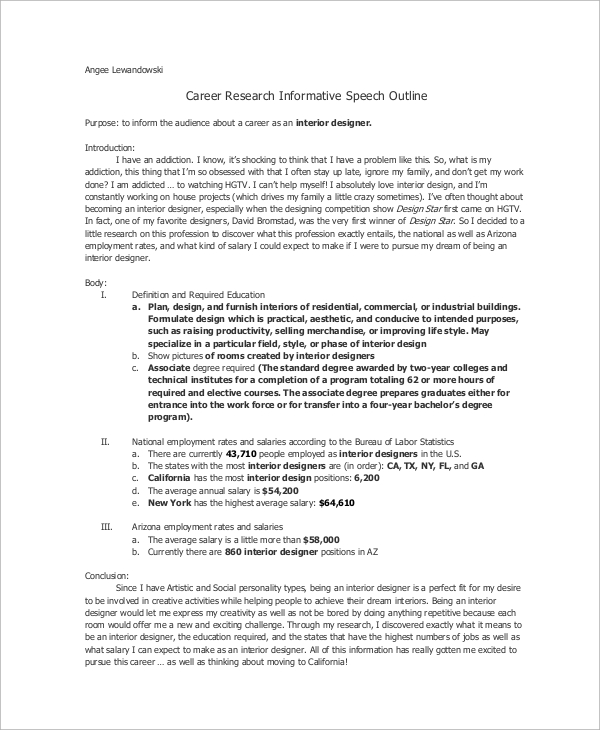
Details
File Format
Size: 45 KB
DownloadThe above-mentioned informative Welcome Speech Examples contain all the guidelines required to deliver mind-blowing speeches in school, colleges, competitions and even in corporate events. It lists multiple statements to be used to get attention at once. It also contains a list of action words and phrases. It provides all the required steps to prepare a summary of a particular topic or on a specific person.
How to write an informative speech about a person?
Research their life, achievements, and impact, organize the information chronologically or thematically, and highlight significant events and contributions to give a comprehensive and engaging overview of their life..
How long should an informative speech be?
An informative speech typically lasts between 5 to 15 minutes, depending on the complexity of the topic and the context of the presentation. You can also see more on Persuasive Speech.
What is the rule of three in an informative speech?
The rule of three suggests that presenting information in groups of three makes it easier for the audience to understand, remember, and engage with the content.
What is the goal of an informative speech?
The goal of an informative speech format is to educate the audience by providing clear, accurate, and engaging information about a specific topic, enhancing their understanding and knowledge. You can also see more on
In conclusion, an informative speech serves to enlighten and educate the audience about a specific topic. By presenting facts, sharing insights, and explaining concepts clearly, the speaker helps listeners gain a better understanding of the subject. This fosters informed perspectives and encourages further exploration and learning.
If you have any DMCA issues on this post, please contact us.
Related Posts
Timetable
Training Evaluation Forms
Acceptance Speech
Scientific Reports Samples & Templates
Attendance List Samples & Templates
Sample Meeting Minutes Templates
Presentation Speech Samples & Templates
Ukulele Chord Chart Samples & Templates
Retirement Speech Samples & Templates
Weekly Schedule Samples & Templates
Contractual Agreement Samples & Templates
FREE 9+ Amazing Sample Church Bulletin Templates in PSD | PDF
Sample Business Card Templates
Sample Cashier Job Descriptions
Questionnaire Samples
